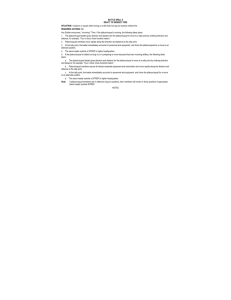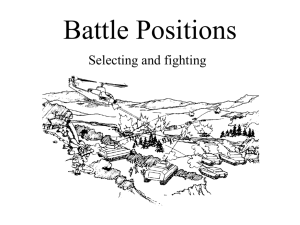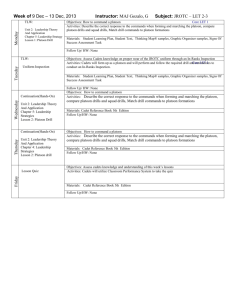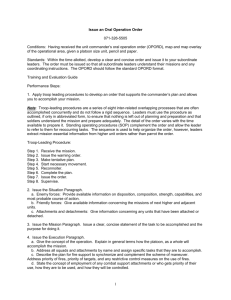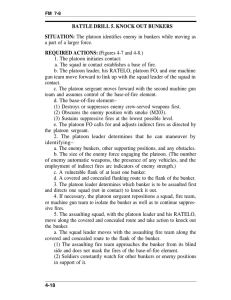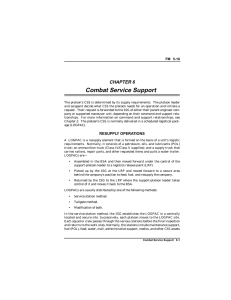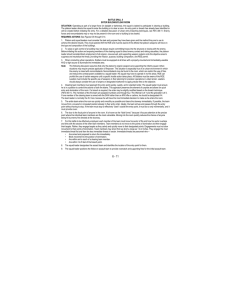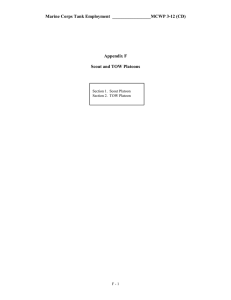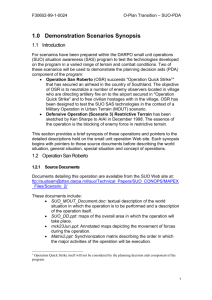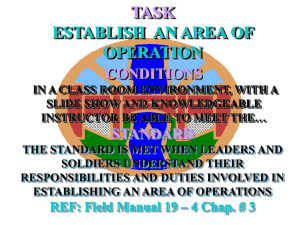MP Platoon Security: Critical Site Task Training
advertisement
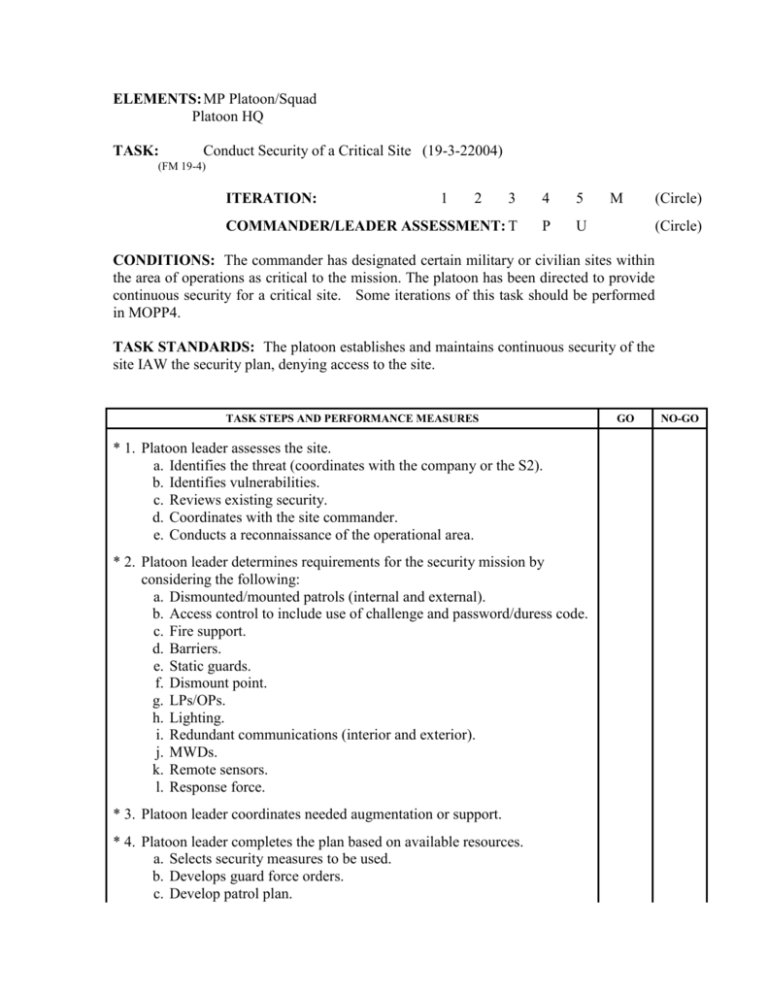
ELEMENTS: MP Platoon/Squad Platoon HQ TASK: Conduct Security of a Critical Site (19-3-22004) (FM 19-4) ITERATION: 1 2 3 4 5 COMMANDER/LEADER ASSESSMENT: T P U M (Circle) (Circle) CONDITIONS: The commander has designated certain military or civilian sites within the area of operations as critical to the mission. The platoon has been directed to provide continuous security for a critical site. Some iterations of this task should be performed in MOPP4. TASK STANDARDS: The platoon establishes and maintains continuous security of the site IAW the security plan, denying access to the site. TASK STEPS AND PERFORMANCE MEASURES * 1. Platoon leader assesses the site. a. Identifies the threat (coordinates with the company or the S2). b. Identifies vulnerabilities. c. Reviews existing security. d. Coordinates with the site commander. e. Conducts a reconnaissance of the operational area. * 2. Platoon leader determines requirements for the security mission by considering the following: a. Dismounted/mounted patrols (internal and external). b. Access control to include use of challenge and password/duress code. c. Fire support. d. Barriers. e. Static guards. f. Dismount point. g. LPs/OPs. h. Lighting. i. Redundant communications (interior and exterior). j. MWDs. k. Remote sensors. l. Response force. * 3. Platoon leader coordinates needed augmentation or support. * 4. Platoon leader completes the plan based on available resources. a. Selects security measures to be used. b. Develops guard force orders. c. Develop patrol plan. GO NO-GO TASK STEPS AND PERFORMANCE MEASURES d. Integrates ROE/ROI into plans. e. Submits plan to company operations center or division provost marshal for review. f. Issues OPORD. 5. Teams establish communications. 6. Teams control access to the protected site. a. Establish sally port. (1) Conduct vehicle searches and personnel searches. (2) Search for contraband. b. Operate a dismount point. (1) Allow only authorized persons and vehicles access to the protected site. (2) Direct vehicles into authorized parking areas and control dispersion of vehicles. c. Establish barrier control measures using available materials to slowly channel and/or deny access to traffic. d. Implement use of access roster, badge system, and duress code. e. Enforce light and noise discipline. f. Maintain communications with platoon headquarters or site security control center. g. Establish challenge and password system. h. Use night-vision devices. 7. Teams establish perimeter protection. a. Establish LP/OP. b. Set up an intrusion detection system to include sensors, surveillance equipment, or cameras. c. Use night-vision devices. d. Coordinate with MWD patrols. e. Emplace perimeter control measures to include concertina wire, mines, fire pits, trenches, barricades, fences, guard posts, and guard towers. f. Establish fighting positions. 8. Teams implement patrol plan. a. Conduct interior patrols. (1) Restrict access to restricted areas. (2) Enforce two-person rule. (3) Respond to security breeches. (4) Inspect barriers and report problems. b. Conduct exterior patrols. (1) Prevent unauthorized approach. (2) Respond to incidences and accidents. (3) Conduct information dissemination and reporting. (4) Inspect barriers and report problems. GO NO-GO TASK STEPS AND PERFORMANCE MEASURES GO NO-GO * 9. Platoon leader monitors mission progress. a. Checks the work of the platoon sergeant and squad leaders. b. Receives status reports from platoon sergeant and squad leaders. c. Reports mission status to higher headquarters. TASK PERFORMANCE / EVALUATION SUMMARY BLOCK ITERATION 1 2 3 4 5 M TOTAL TOTAL TASK STEPS EVALUATED TOTAL TASK STEPS “GO” TRAINING STATUS “GO”/“NO-GO” “*” indicates a leader task step. SUPPORTING INDIVIDUAL TASKS References STP 19-31II-MQS STP 19-95B1-rev-SM STP 19-95B24-SM-TG Task Number 03-3761.00-1101 191-376-4108 191-376-4114 191-376-5122 113-573-8006 191-377-4201 STP 21-1-SMCT 071-331-0801 071-331-0815 113-571-1022 STP 21-24-SMCT 071-326-5705 Task Title Prepare a Physical Security Plan Operate A Dismount Point CONTROL ENTRY TO AND EXIT FROM A RESTRICTED AREA SEARCH A VEHICLE USE AN AUTOMATED SIGNAL OPERATION INSTRUCTION (SOI) ESTABLISH/SUPERVISE A DISMOUNT POINT CHALLENGE PERSONS ENTERING YOUR AREA PRACTICE NOISE, LIGHT, AND LITTER DISCIPLINE PERFORM VOICE COMMUNICATIONS ESTABLISH AN OBSERVATION POST OPFOR TASKS AND STANDARDS TASK: CONDUCT AIR ATTACKS (19-OPFOR-1006) CONDITION: OPFOR elements in the rear area have forwarded the positions of enemy support sites and/or the locations of road march elements. OPFOR aircraft have been dispatched to attack enemy installations or convoys. STANDARD: 1. Locate command and control sites or convoys. 2. Conduct attack runs on designated targets. 3. Destroy enemy equipment, supplies, vehicles, and personnel. 4. Sustain minimum aircraft losses. TASK: CONDUCT RAID (19-OPFOR-1009) CONDITION: An OPFOR element has occupied an objective rally point. The element has orders to conduct a raid on a combat service support base. STANDARD: 1. Surprise enemy forces. 2. Assault enemy support base and accomplish assigned tasks. 3. Destroy specified equipment and supplies. 4. Avoid decisive engagement. 5. Withdraw all personnel from objective areas within time prescribed. 6. Obtain all priority intelligence requirements from raid site. 7. Sustain only light casualties from enemy fire. TASK: CONDUCT TERRORIST AND SABOTEUR ATTACKS (19-OPFOR-1013) CONDITION: The OPFOR dispatches small teams into the enemy rear area to disrupt combat service support operations. STANDARD: 1. Locate rear support bases and command and control facilities. 2. Delay and disrupt combat service support operations through probes.3. Infiltrate combat service support bases to conduct sabotage and terrorist activities. 4. Inflict light casualties. 5. Destroy supplies and equipment.

